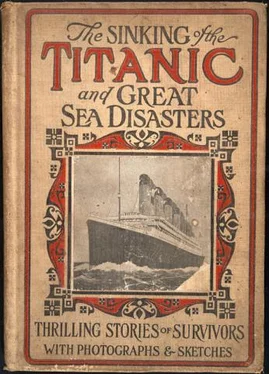Logan Marshall - Sinking of the Titanic and Great Sea Disasters
Здесь есть возможность читать онлайн «Logan Marshall - Sinking of the Titanic and Great Sea Disasters» весь текст электронной книги совершенно бесплатно (целиком полную версию без сокращений). В некоторых случаях можно слушать аудио, скачать через торрент в формате fb2 и присутствует краткое содержание. Год выпуска: 1912, Жанр: Прочая документальная литература, на английском языке. Описание произведения, (предисловие) а так же отзывы посетителей доступны на портале библиотеки ЛибКат.
- Название:Sinking of the Titanic and Great Sea Disasters
- Автор:
- Жанр:
- Год:1912
- ISBN:нет данных
- Рейтинг книги:4.5 / 5. Голосов: 2
-
Избранное:Добавить в избранное
- Отзывы:
-
Ваша оценка:
- 100
- 1
- 2
- 3
- 4
- 5
Sinking of the Titanic and Great Sea Disasters: краткое содержание, описание и аннотация
Предлагаем к чтению аннотацию, описание, краткое содержание или предисловие (зависит от того, что написал сам автор книги «Sinking of the Titanic and Great Sea Disasters»). Если вы не нашли необходимую информацию о книге — напишите в комментариях, мы постараемся отыскать её.
’s demise!
Sinking of the Titanic and Great Sea Disasters — читать онлайн бесплатно полную книгу (весь текст) целиком
Ниже представлен текст книги, разбитый по страницам. Система сохранения места последней прочитанной страницы, позволяет с удобством читать онлайн бесплатно книгу «Sinking of the Titanic and Great Sea Disasters», без необходимости каждый раз заново искать на чём Вы остановились. Поставьте закладку, и сможете в любой момент перейти на страницу, на которой закончили чтение.
Интервал:
Закладка:
Into the last life-boat that was launched from the ship Captain Smith with his own hand lifted a small child into a seat beside its mother. As the gallant, officer performed his simple act of humanity several who were already in the boat tried to force the captain to join them, but he turned away resolutely toward the bridge.
That act was significant. Courteous, kindly, of quiet demeanor and soft words, he was known and loved by thousands of travelers.
When the English firm, A. Gibson & Co. of Liverpool, purchased the American clipper, Senator Weber, in 1869, Captain Smith, then a boy, sailed on her. For seven years he was an apprentice on the Senator Weber, leaving that vessel to go to the Lizzie Fennell, a square rigger, as fourth officer. From there he went to the old Celtic of the White Star Line as fourth officer and in 1887 he became captain of that vessel. For a time he was in command of the freighters Cufic and Runic; then he became skipper of the old Adriatic. Subsequently he assumed command of the Celtic, Britannic, Coptic (which was in the Australian trade), Germanic, Baltic, Majestic, Olympic and Titanic, an illustrious list of vessels for one man to have commanded during his career.
It was not easy to get Captain Smith to talk of his experiences. He had grown up in the service, was his comment, and it meant little to him that he had been transferred from a small vessel to a big ship and then to a bigger ship and finally to the biggest of them all.
“One might think that a captain taken from a small ship and put on a big one might feel the transition,” he once said. “Not at all. The skippers of the big vessels have grown up to them, year after year, through all these years. First there was the sailing vessel and then what we would now call small ships—they were big in the days gone by—and finally the giants to-day.”
{illust. caption = VESSEL WITH BOTTOM OF HULL RIPPED OPEN
A view of the torpedo destroyer Tiger, taken in drydock after her collision with the Portland Breakwater last September; the damage to the Tiger, which is plainly shown in the photograph, is of the same character, though on a smaller scale, as that which was done to the Titanic.}
{illust. caption = A VIEW OF THE OLYMPIC
The sister-ship of the Titanic, showing the damage done to her hull in the collision with British war vessel, Hawke, in the British Channel.}
Only once during all his long years of service was he in trouble, when the Olympic, of which he was in command, was rammed by the British cruiser Hawke in the Solent on September 20, 1911. The Hawke came steaming out of Portsmouth and drew alongside the giantess. According to some of the passengers on the Olympic the Hawke swerved in the direction of the big liner and a moment later the bow of the Hawke was crunching steel plates in the starboard quarter of the Olympic, making a thirty-foot hole in her. She was several months in dry dock.
The result of a naval court inquiry was to put all the blame for the collision on the Olympic. Captain Smith, in his testimony before the naval court, said that he was on the bridge when he saw the Hawke overhauling him. The Olympic began to draw ahead later or the Hawke drop astern, the captain did not know which. Then the cruiser turned very swiftly and struck the Olympic at right angles on the quarter. The pilot gave the signal for the Olympic to port, which was to minimize the force of the collision. The Olympic’s engines had been stopped by order of the pilot.
Up to the moment the Hawke swerved, Captain Smith said, he had no anxiety. The pilot, Bowyer, corroborated the testimony of Captain Smith. That the line did not believe Captain Smith was at fault, notwithstanding the verdict of the board of naval inquiry, was shown by his retention as the admiral of the White Star fleet and by his being given the command of the Titanic.
Up to the time of the collision with the Hawke Captain Smith when asked by interviewers to describe his experiences at sea would say one word, “uneventful.” Then he would add with a smile and a twinkle of his eyes:
“Of course there have been winter gales and storms and fog and the like in the forty years I have been on the seas, but I have never been in an accident worth speaking of. In all my years at sea (he made this comment a few years ago) I have seen but one vessel in distress. That was a brig the crew of which was taken off in a boat by my third officer. I never saw a wreck. I never have been wrecked. I have never been in a predicament that threatened to end in disaster of any sort.”
Once the interviewer stopped asking personal questions, Captain Smith would talk of the sea, of his love for it, how its appeal to him as a boy had never died.
“The love of the ocean that took me to sea as a boy has never died.” he once said. “When I see a vessel plunging up and down in the trough of the sea, fighting her way through and over great waves, and keeping her keel and going on and on—the wonder of the thing fills me, how she can keep afloat and get safely to port. I have never outgrown the wild grandeur of the sea.”
When he was in command of the Adriatic, which was built before the Olympic, Captain Smith said he did not believe a disaster with loss of life could happen to the Adriatic.
“I cannot conceive of any vital disaster happening to the Adriatic,” he said. “Modern shipbuilding has gone beyond that. There will be bigger boats. The depth of harbors seems to be the great drawback at present. I cannot say, of course, just what the limit will be, but the larger boat will surely come. But speed will not develop with size, so far as merchantmen are concerned.
“The traveling public prefers the large comfortable boat of average speed, and anyway that is the boat that pays. High speed eats up money mile by mile, and extreme high speed is suicidal. There will be high speed boats for use as transports and a wise government will assist steamship companies in paying for them, as the English Government is now doing in the cases of the Lusitania and Mauretania, twenty-five knot boats; but no steamship company will put them out merely as a commercial venture.”
Captain Smith believed the Titanic to be unsinkable.
And though the ship turned out to be sinkable, the captain, by many acts of bravery in the face of death, proved that his courage was equal to any test.
Captain Inman Sealby, commander of the steamer Republic, which was the first vessel to use the wireless telegraph to save her passengers in a collision, spoke highly of the commander of the wrecked Titanic, calling him one of the ablest seamen in the world.
“I am sure that Captain Smith did everything in his power to save his passengers. The disaster is one about which he could have had no warning. Things may happen at sea that give no warning to ships’ crews and commanders until the harm comes. I believe from what I read that the Titanic hit an iceberg and glanced off, but that the berg struck her from the bottom and tore a great hole.”
Many survivors have mentioned the captain’s name and narrated some incident to bring out his courage and helpfulness in the emergency; but it was left to a fireman on board the Titanic to tell the story of his death and to record his last message. This man had gone down with the White Star giantess and was clinging to a piece of wreckage for about half an hour before he finally joined several members of the Titanic’s company on the bottom of a boat which was floating about among other wreckage near the Titanic.
Harry Senior, the fireman, with his eight or nine companions in distress, had just managed to get a firm hold in the upturned boat when they saw the Titanic rearing preparatory to her final plunge. At that moment, according to the fireman’s story, Captain Smith jumped into the sea from the promenade deck of the Titanic with a little girl clutched in his arms. It took only a few strokes to bring him to the upturned boat, where a dozen hands were stretched out to take the little child from his arms and drag him to a point of safety.
Читать дальшеИнтервал:
Закладка:
Похожие книги на «Sinking of the Titanic and Great Sea Disasters»
Представляем Вашему вниманию похожие книги на «Sinking of the Titanic and Great Sea Disasters» списком для выбора. Мы отобрали схожую по названию и смыслу литературу в надежде предоставить читателям больше вариантов отыскать новые, интересные, ещё непрочитанные произведения.
Обсуждение, отзывы о книге «Sinking of the Titanic and Great Sea Disasters» и просто собственные мнения читателей. Оставьте ваши комментарии, напишите, что Вы думаете о произведении, его смысле или главных героях. Укажите что конкретно понравилось, а что нет, и почему Вы так считаете.












